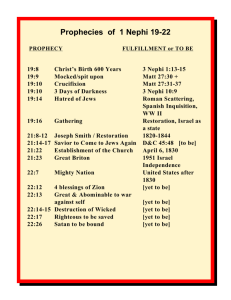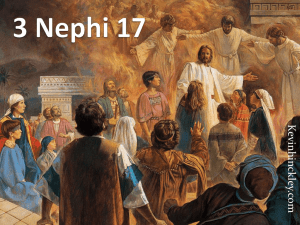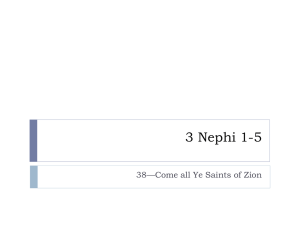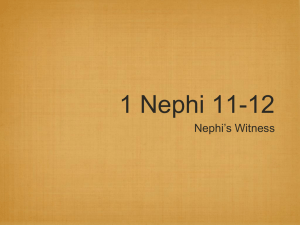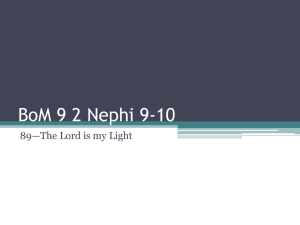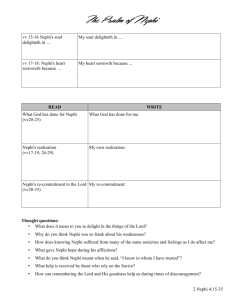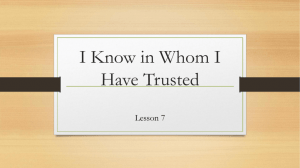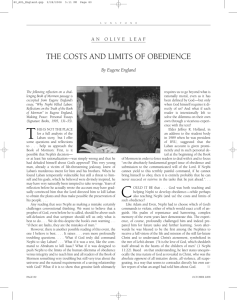Lesson 42 2 Nephi 33 Witness of the Holy Ghost Power Pt
advertisement
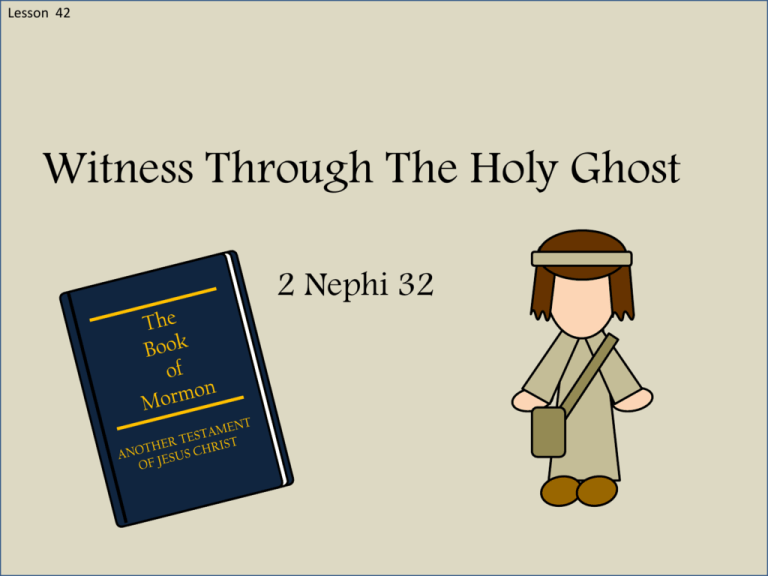
Lesson 42 Witness Through The Holy Ghost 2 Nephi 32 “Success in righteousness, the power to avoid deception and resist temptations, guidance in our daily lives, healing of the soul—these are but a few of the promises the Lord has given to those who will come to His word.” Ezra T. Benson Nephi Laments Not mighty in writing— Nephi realizes that the messages he is speaking is difficult to write, because when he speaks he speaks by the power of the Holy Ghost. into unto What is the difference between a message going unto someone’s heart and a message going into someone’s heart? Why do you think it is significant that the Holy Ghost carries the truth unto our hearts but not into our hearts? 2 Nephi 1 “Please notice how the power of the Spirit carries the message unto but not necessarily into the heart. A teacher can explain, demonstrate, persuade, and testify, and do so with great spiritual power and effectiveness. Ultimately, however, the content of a message and the witness of the Holy Ghost penetrate into the heart only if a receiver allows them to enter” David A. Bednar “Why just unto the heart? Individual agency is so sacred that Heavenly Father will never force the human heart, even with all His infinite power. … God allows us to be the guardians, or the gatekeepers, of our own hearts. We must, of our own free will, open our hearts to the Spirit” Gerald N. Lund 2 Nephi 1 When we open Behaviors our hearts,of Hardened Hearts messages from the Holy Ghost can enter our hearts Pride Envy 2 Nephi 1 Rebellion Faithlessness Loss of the Spirit Words Written in Weakness “If you receive not the Spirit ye shall not teach” D&C 42:14 If a message is from God, the Spirit will bear witness of it, whether it is delivered orally or in writing. Any doctrine that opposes the principle of revelation is rooted in the kingdom of darkness. Those who argue for a closed canon, declaring the Bible to be the final or last word that God will speak, have at the same time closed the door to any possibility of understanding the true meaning of the Bible. Revelation can be understood only by the spirit of revelation. Nephi knew that the record in which he was making would be rejected by those who deny the spirit of revelation. He also knew that those who rejected the testimony of the Book of Mormon would do so in the name of loyalty to the Bible. 2 Nephi 1-2 and JFM and RLM The Purpose of Nephi’s Record A hope that his readers will believe in Christ For I pray continually for them by day, and mine eyes water my pillow by night, because of them; and I cry unto my God in faith, and I know that he will hear my cry. 2 Nephi 33:3 I know that the Lord God will consecrate my prayers for the gain of my people. 2 Nephi 33:4 I glory in plainness; I glory in truth; I glory in my Jesus, for he hath redeemed my soul from hell. 2 Nephi 33:6 I pray continually for … I know … I glory … I have … I have charity for my people, and great faith in Christ that I shall meet many souls spotless at his judgment-seat. How can we strengthen our personal testimonies of 2 Nephi 33:7 2 Nephi 3-7 Jesus Christ and His Atonement? President Joseph Fielding Smith said: “It seems to me that any member of this Church would never be satisfied until he or she had read the Book of Mormon time and time again, and thoroughly considered it so that he or she could bear witness that it is in very deed a record with the inspiration of the Almighty upon it, and that its history is true” Joseph Fielding Smith “There will come into [their] lives and into [their] homes an added measure of the Spirit of the Lord, a strengthened resolution to walk in obedience to His commandments, and a stronger testimony of the living reality of the Son of God” Gordon B. Hinckley Nephi’s Farewell “The Book of Mormon is the most Christ centered scriptural record ever published. Every doctrine within its covers is but an appendage to its central theme—the testimony that Jesus is the Christ. All who believe in Christ will believe the words of this book. One cannot truly believe in the Bible and at the same time not believe in the Book of Mormon.” JFM and RLM 2 Nephi 10 “There is not that person on the face of the earth who has had the privilege of learning the gospel of Jesus Christ from these two books (the Bible and the Book of Mormon), that can say that one is true, and the other is false. No Latter-day Saint, no man or woman, can say the Book of Mormon is true, and at the same time say that the Bible is untrue. If one be true, both are; and if one be false, both are false.” Brigham Young A Rejection Christ was rejected by a nation professing loyalty to the Law of Moses “Do not think that I will accuse you to the Father: there is one that accuseth you, even Moses, in whom ye trust. For had ye believed Moses, ye would have believed me: for he wrote of me. But if ye believe not his writings, how shall ye believe my words?” John 5:45-47 Joseph Smith was rejected by many who profess loyalty to the Bible… Even though he is mentioned in the Bible by Moses, Ezekiel, and Isaiah “Nephi, as with all the holy prophets since the world began, will stand at the judgment bar of god as a witness against those who rejected his testimony.” JFM and RLM 2 Nephi 11 Crying From the Dust Nephi understood the destiny of the record he was keeping He knew: The record would spring forth out of the earth –Psalm 85:11 Isaiah 45:8 Carrying: The testimony of those whose bodies had long since returned to the dust Isaiah 29:4 1 Nephi 27:13 2 Nephi 13-14 All would be judged: By the manner in which they accepted or rejected the voice of prophecy as it was available to them, either in scriptural writ or by the voice of living oracles (Prophets) Sealed on Earth A Pattern in which the prophets of all ages seal their teaching with a testimony that what they have taught is dive truth. (D&C 1:8-10) Nephi sealed his testimony “For what I seal on earth, shall be brought against you at the judgment bar; for thus hath the Lord commanded me, and I must obey. Amen.” 2 Nephi 15 What Have We Learned? Who is narrating this account? Who is speaking? Who is receiving the message? What is happening in this account? What has happened before this event? What is the message of this story? What did the writer intend for us to learn from this story? (Doctrine or Principle) Sources: Ezra T Benson The Power of the Word Ensign May 1986 David A Bednar (“Seek Learning by Faith” [address to CES religious educators, Feb. 3, 2006], 1, si.lds.org). Gerald N. Lund (“Opening Our Hearts,” Ensign or Liahona, May 2008, 33). Joseph Fielding McConkie and Robert L. Millet Doctrinal Commentary Vol 1 pg 172-174 Brigham Young Journal of Discourses 1:38 Joseph Fielding Smith (in Conference Report, Oct. 1961, 18). Gordon B. Hinckley (“A Testimony Vibrant and True,” Ensign, Aug. 2005, 6).
